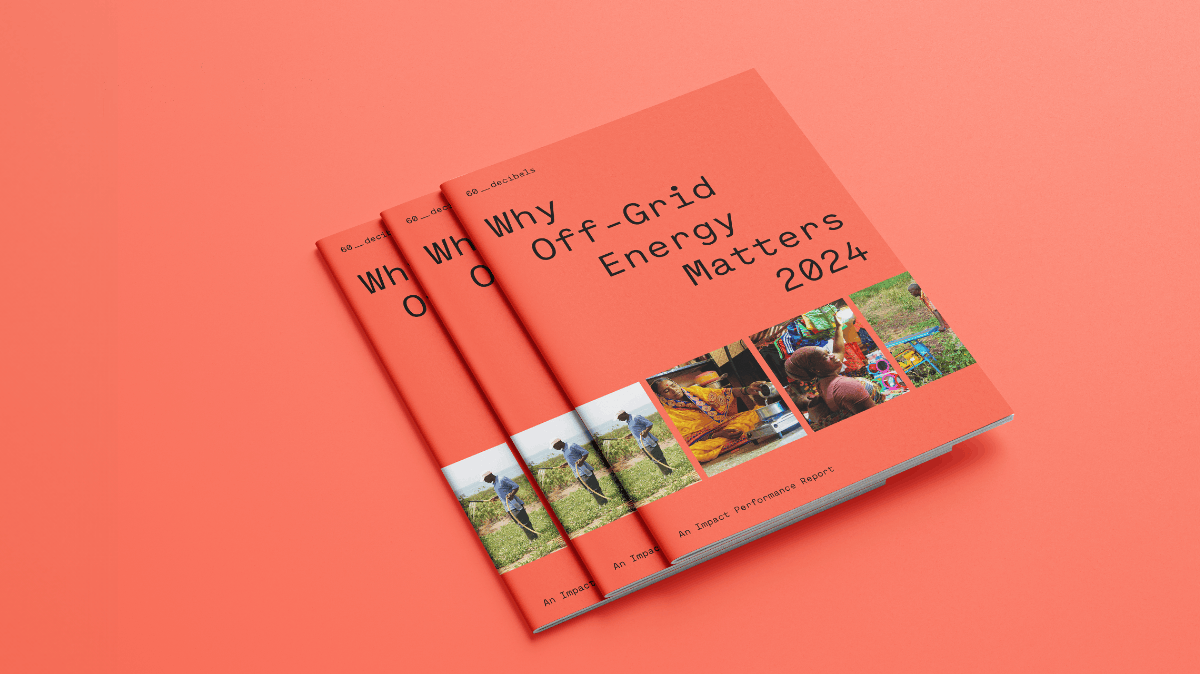

Women’s Vital Role in the Off-Grid Energy Sector
In the off-grid energy sector, women cut across every function and responsibility, from being customers and beneficiaries to small business owners, large enterprise directors and sector investors. Understanding their experiences is essential to better serve women and girls, and to ensure no-one is left behind when it comes to energy access. Our latest report, Why Off-Grid Matters 2024, delves into statistics gathered over four years from 79,000+ customers across more than 30 countries. The world’s largest social performance assessment of the sector to date, the report uncovers nuanced findings about the impact of off-grid energy on women (and men), revealing how their engagement significantly shapes the sector.
Notably, it also highlights that women-led off-grid energy businesses tend to outperform their counterparts in areas such as impact, female reach, poverty reach, ease of use, and satisfaction rates, underscoring the efficacy of women’s leadership in driving access to sustainable and impactful energy solutions. Here’s a sneak preview of our topline insights on this topic:
Women outperform as business leaders
While women-led organizations are vastly underrepresented in terms of investment within off-grid energy – an estimated 1% of off-grid solar industry investments in 2022 went to women-led companies – companies owned and led by women have an important role to play in sustainable energy access for all. With funding from UKAid through the Transforming Energy Access (TEA) platform, Good Energies, and the DOEN Foundation, we launched an initiative in 2023 to understand the impact of early-stage, nascent market, locally owned, and/or women-led organizations. The numbers blew us away.
Our findings suggest women-led companies, on average, generate higher impact, lower rates of customer over-indebtedness, lower challenge rates, and are reaching a higher proportion of women customers than their counterparts. Nine of the top ten companies in our Consumer Protection Score Benchmark are women-owned.
We can’t overstate the importance of these findings enough. They highlight the untapped potential of women-led businesses in understanding and meeting the needs of their communities. We hope these findings encourage investors, policymakers, and other stakeholders to place even greater attention on investing in women-led organizations. As our results have shown, these organizations have a track record of outsized impact.
Gender inclusivity in the off-grid Energy sector
On the other side of the counter, women are key consumers of off-grid energy. Their experience and unique role in the household shapes their usage and the potential impact of off-grid products in the home or in small businesses.

Women may be underrepresented in companies’ customer contact lists, but we know that household usage statistics show a wider adoption. Across energy organizations that have worked with 60dB in the past four years, the ratio of men and women customers is almost exactly 2:1. There is some variation across product types, which, perhaps unsurprisingly, often falls along typical gender roles. For example, 59% of clean cooking customers are women. Women are also more likely to purchase lower-spec and cheaper products, with 42% of solar lantern customers being women. Other products or services like solar home systems, appliances, and mini-grid connections, see a lower representation of women ranging from 20% to 30%; often where larger, more expensive products may require co-decision making and/or the man of the household to sign up to the financing contract.
There has been no change in the ratio of women in organizations’ customer databases since 2020, on average. 68% of the registered customers of energy products and services are men. We know that there are typically other users in the home besides the registered customer who experience the benefits of the energy product.
60 Decibels Gender Experience Score
To measure the unique experiences of men and women customers, we designed a new metric: the Gender Experience Score. This score is calculated using five of our 60 Decibels Core Indicators, and it ranges from -1 to 1. A score of 0 suggests that men and women customers have similar overall experiences with energy service providers. The 60 Decibels Gender Experience Score Benchmark stands at 0.02, indicating very similar experiences overall for both genders. This is good news overall, suggesting that companies are interacting with men and women customers in a similar way.
Key Insights from the Gender Experience Score:
- Women are slightly more likely to be first-time users (78% compared to 75% of men).
- Men are slightly more likely to experience challenges using the energy product or service (33% of men; 30% of women).
- Likely related to the above two points, women tend to be more satisfied with their energy services – the Net Promoter Score (NPS) is 45 for women compared to 39 for men.
- Issue resolution rates are similar, with 31% of both men and women having their issues resolved.
- Customer Effort Scores (CES) are similar for both genders – 3.18 on average for women and 3.24 for men.
It’s clear that women play a pivotal role in the off-grid energy sector, both as leaders in business and users of services. The insights from Why Off-Grid Energy Matters 2024 underscore a critical message: investing in women-led businesses and understanding the unique needs and contributions of women customers are not just equitable choices but smart strategies for sustainable growth. The data presented offer compelling evidence of the positive impact women have on the sector, from driving higher performance in businesses to enhancing customer experience. As we move forward, the challenge for stakeholders in the off-grid energy sector will be to leverage these insights to create more inclusive and effective energy solutions. By doing so, we can ensure that the off-grid energy sector not only grows but thrives, with women at the heart of its success.

Download Why Off-Grid Energy Matters 2024 – featuring opportunities for outsized impact performance, top performers, and 11 key insights across impact, access, customer experience, consumer protection, and more


